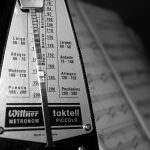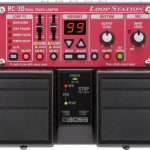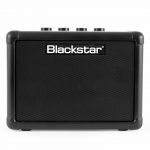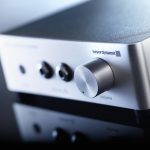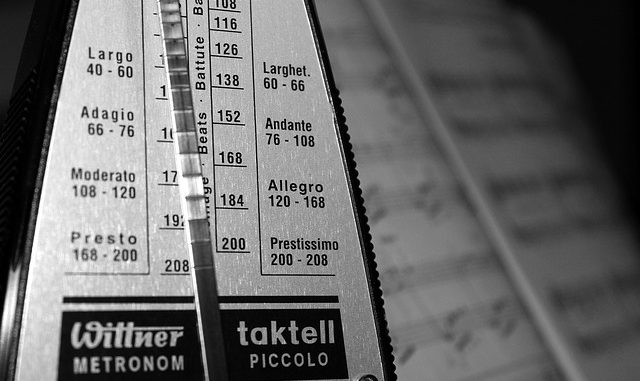
Metronomes are all about staying in time. Whether you’re looking for the best metronome for drummers, a musiccritic’s keyboard stand review, guitarists, pianists or any other type of musician. In the modern age, metronomes come in all sorts of different forms, whether it be apps on your phone, built in to music production software or of course the hardware metronomes which have stood the test of time (pun intended).
It seems like the most simple thing in the world, something that can count in time, but there is a surprising amount to consider when finding out which metronome to buy and which features to look for.
What to Look For In a Metronome
- Outputs. Headphone outputs are incredibly useful if you’re wanting to practice or just want to be able to hear the metronome clearly and avoid others being able to hear it. Different outputs also allow you to plug it into other speakers.
- Volume controls. Volume controls are excellent and allow you to decide on how loud you need the metronome to be, not overpowering but not too quiet to hear.
- Portability. Nobody wants a metronome which is stuck in one place, whether you’re a guitarist, drummer or another musician, you need to be able to move your metronome from one place to another.
- Time signatures and tempos. This is a vital part of a metronome. Most genres of music will at some stage need you to play in another time signature and often the need for a metronome is to practice new tempos and time signatures. Of course you need to be able to pick the tempo and time signature to help you stay in time. The variation in tempo is also a big selling point for these products, and some will go from around 30 BPM all the way up to around 250 BPM or even higher.
- Tuners. This isn’t always necessary but a lot of metronomes have tuners built in, this is a bonus and means one less piece of kit you need to carry around with you. The tuners are often designed for multiple instruments.
- Beat Patterns. Want to practice different variations or with different beat patterns behind you? This can help you to become a better, more rounded player but can also just help with variation and avoiding monotony.
- Reliability. This is obvious, but so so vital. For a metronome to be able to keep you in time, it needs to be able to stay in time itself. With the best digital metronomes the accuracy is pretty incredible, but the analog metronomes, though they may look cool, can become unreliable if they’re damaged.
- If you plan to use it on stage then you probably want somewhere you can mount the metronome, some are more mountable than others and depending what you plan to use it for this can be a big plus point. Some drummers and even other instrumentalists (solo or otherwise) may want to take there’s on stage.
- Power. This is a big feature for metronomes. Most are powered via batteries, which is fine (as long as you make sure you’ve got plenty of juice left before a gig or practice). Some have adapters to go into the mains and some metronomes even work without power at all, and the best wind up metronomes mean that you’ll never have to worry about losing battery, but that some of the features may be a little bit basic.
As you can see, there is a lot to consider, but don’t get overwhelmed. We’ve picked some of the best digital and wind up metronomes for your perusal below. You can quickly choose which is going to be the best for your needs, as long as you have given a little thought to which of the features above will be most suitable for you, and the settings in which you plan to use your metronome.
Metronome Reviews
Korg MA-1 Portable Metronome
Korg are a brand that most musicians have heard of or even used at some point, and they have a wide range of musical instruments and accessories. Their metronome offering is pretty great, and the MA-1 is a portable and reliable metronome that is well worth considering if you’re in the market for something to take out and about with you.
This is such a small metronome, and can of course fit in your pocket, which is great for taking to practices and gigs, drummers and guitarists alike tend to have a lot of gear to take out and about with them, so you don’t want a massive metronome to add to all of it.
As you might expect from something designed to be portable and simple, it doesn’t necessarily have that many of the ‘advanced’ features, but it does have all the basics you’re likely to need. Features include swing, the ability to tap the tempo, speed adjust and volume. It has a headphone output which means you can plug your headphones on for private practice or listening, and also that you can take the output and plug it into another speaker if that is how you would prefer to use it.
At the time of writing, this is definitely one of the cheapest metronomes we’ve come across, and even though the features aren’t all the most advanced, there is plenty on offer and enough for a lot of our needs. A look at the Korg MA-1 reviews on Amazon and elsewhere on the internet show many five star and otherwise positive reviews with people praising the portability and value for money on offer here. It may not be the “very best” in terms of metronomes but it certainly does a good job for the price!
Boss DB-90
I would argue that this is possibly the most famous metronome in musicians circles. Boss have a history of making excellent music electronics such as tuners and of course in this case, metronomes. The DB-90 includes so many cool features.
It doesn’t matter what your favorite instrument is or what you plan to use it for, the DB-90 will likely be able to help you. It has 4 types of click track which even includes a human mode (a human voice counting you along). The DB-90 also has an amazing benefit of being able to hook up with drum machine rhythms and even lets you program beats, which can even work ina performance!
The feature which sets this apart is the fact that it has an input. So if you want to plug in your microphone, bass, guitar or any other instrument, you can practice with your headphones in and still hear clearly.
It has an ‘onboard rhythm coach’ which is good for the drummers out there, and it even has a Midi input so you can plug midi devices into the Boss DB-90. It is hard to argue with the many people who will claim that this is the very best metronome on the market, and the flexibility it has is wonderful.
Not only is this a metronome, it is a learning (and teaching) tool. Intelligently designed and very intuitive, the only criticism I see regularly is the fact that this has been in production for a number of years, and isn’t the most modern looking or feeling metronome. Some modern metronomes have things like touch screens and other hi-tech, but in reality (and in musical terms) this does everything you’re likely to need it to.
Is it the cheapest? Absolutely not when compared to some of the ‘budget’ models, but in reality, considering the trust we have in the Boss brand, and the durability this has been designed with and the build quality Boss boast, it is worth the little extra investment if you’re a serious musician.
Seiko SQ50-V Quartz Metronome Review
Time for a model without the bells and whistles. Seiko are a brand you’re probably more likely to associate with timepieces than with musical products, so it is fair to say that keeping time shouldn’t be a problem for the SQ50-V. In the manufacturer’s words, it is their ‘most basic’ model, and that is very fair as an assessment, but basic isn’t a criticism in my book.
This is not a wind up metronome, but it is more like a clock than anything. It makes a percussive sound and will hold a tempo brilliantly, which is all some people need from their metronome. If you want something basic, where the batteries will last a long time and reliability is at the forefront, but that doesn’t cost the earth, this could be the one for you.
Tempi Metronome Review – The Best Wind Up Metronome
If you do happen to be in the market for a wind up metronome, and one where you never have to worry about running out of batteries.
On top of being a very reliable metronome, this is a thing of beauty! It looks like a classy timepiece rather than some digital monstrosity. Depending on the setting you’re going to be using it in, this can be a big plus point. If you’re putting it on top of a beautiful grand piano then having a grubby old digital metronome can take a bit of the beauty away! If you want something that will look good whilst it does the job of keeping you in time, this could be the one for you.
We wanted to include at least one wind up metronome on the list, as I know that there will always be demand for them, and there’s not a lot more you could ask from this type of product. Features include:
- Tempos from 40-208bpm
- Accuracy, especially considering it is not a digital model.
- Two year warranty.
The words simple and effective come to mind when talking about the Tempi metronome. Gets the nod if you’re looking for a good quality metronome that you don’t have to power.
Metronome Apps – The Verdict
“There’s an app for that” as the saying goes. The truth is there are a huge amount of apps available for pretty much anything musical, and metronomes are no exception. If your need for a metronome is not very common then an app can sometimes fill a gap, but in all honesty, buying a standalone metronome has a lot of advantages.
An app comes with downsides, especially if you need to use a metronome for recording and live performances:
- If your metronome app doesn’t block other sounds, you can get interrupted by alerts from messages or other apps.
- Battery life on a lot of phones and tablets can be very poor.
- You can’t use the device for other things simultaneously (E.G. recording).
- Phones and tablets are liable to crash.
Of course, there is an element of personal preference, but if you’re a professional musician or at least want to give yourself a professional setup, investing in a metronome is advisable. You can buy some great metronomes under $100 and good metronomes under $50 so having something pro doesn’t have to cost you the earth, and can improve your musicianship a whole load.
Conclusion
As you will be able to tell by now, there is a lot to decide upon when buying a metronome considering it is a relatively simple device. They are available with all sorts of features at different price ranges, and deciding on the best one for you depends upon which type of musician you are. That said, certain brands and models, such as the metronome reviews in this article, will be much more likely to satisfy your needs than others.
If you have experience with any of the metronomes mentioned above or care to share anything else, feel free to drop your thoughts in the comments.

